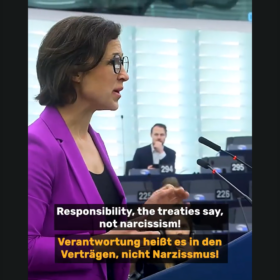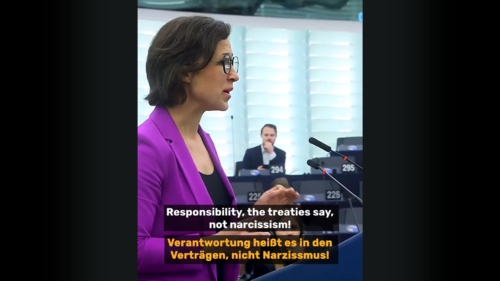This year, I once more attended the Munich Security Conference: In 2020, I had taken part for the first time as an MEP; in 2021, the event was held as a digital “Munich Special Edition” due to the Covid-19 pandemic.
2021 was a year full of crises, with “little reason for geopolitical optimism,” as the organizer put it, which is why this year’s conference had “Unlearning Helplessness” as its theme. A photo was widely shared online showing a large, all-male lunch panel at the MSC – the story also was covered by many media outlets. But the proportion of women amongst this year’s speakers in the main programme was 45%.
This year, climate and security was an intensely debated topic at the MSC. Our new Foreign Minister Annalena Baerbock put the main emphasis on the fight against the climate crisis. She discussed the “climate crisis as the security and peace policy challenge of our century” with the Egyptian Foreign Minister Sameh Shoukry and the US Climate Special Representative John Kerry.
You are currently viewing a placeholder content from X. To access the actual content, click the button below. Please note that doing so will share data with third-party providers.
More Information
You are currently viewing a placeholder content from X. To access the actual content, click the button below. Please note that doing so will share data with third-party providers.
More Information
You are currently viewing a placeholder content from X. To access the actual content, click the button below. Please note that doing so will share data with third-party providers.
More InformationIn 2020, China had been the centre of interest at the MSC. The situation in the country has not changed ever since, yet the recent highly worrying developments brought a new topic into focus: Russia and the Ukraine.
This crisis is not a "Ukrainian crisis" but a Russian crisis
There were no big controversies at the conference, as neither Chinese nor Russian officials were present. It was a conference where the elephant literally refused to be in the room.
My personal highlight was Annalena Baerbock’s speech on the situation in Ukraine: She first and foremost addressed the situation of the people living at the front line, whose safety and lives are threatened. These people are the ones suffering most and want nothing more than peace. One thing is clear: this crisis is not a “Ukrainian crisis”, but a Russian crisis, since the aggressor clearly is Russia.
The disagreements we have with our US partners were pushed aside by our joint stand against the Russian aggression. This is why on the main stage, one could witness a show of solidarity rather than critical debates.
„It is not the role of women to be the beautiful decor that beautifies the image of tyrannies"
This is a quote of journalist Tawakkol Karman, also called the “Mother of revolution” in Yemen. On the panel “Participation for Peace”, I discussed with her the role of women in conflicts and humanitarian crises. The “Mother of Women’s Rights Defenders,” author and founder of the International Civil Society Action Network Sanam Naraghi was also present at the panel. The panel “Abraham Accords – Peace by Piece” on the situation in the Middle East was also an important one for me:
The humanitarian situation and the threat against women in Afghanistan are deeply troubling; the situation in Yemen and Syria is dire. The closing of the deep rift between the Gulf States and Israel represents a ray of hope – but this reconcilitation process must not happen at the expense of Palestinians and the safety of human rights defenders.


The MSC was also an opportunity for me to meet and exchange ideas with old colleagues and friends, including the author, journalist and filmmaker Düzen Tekkal, who is of Kurdish-Yazidi descent. We first met in 2014, when Yazidis in Iraq were attacked, kidnapped, raped and killed. Society is still suffering today, many women are still missing, children cannot return home and most of the crimes remain unresolved. Overcoming the damage and trauma the war has left will take a very long time.
Personal contacts are very important for me as a politician, in order to establish networks, to discuss with activists, to talk about topics that are dear to my heart, and to initiate joint initiatives. Many things are in the pipeline for me at present – so stay tuned!













